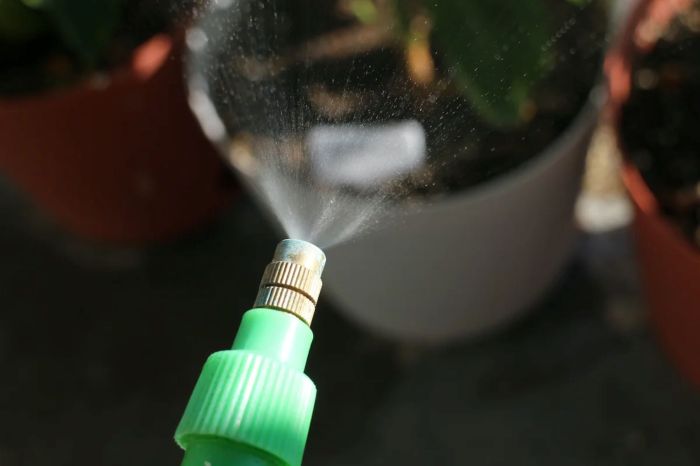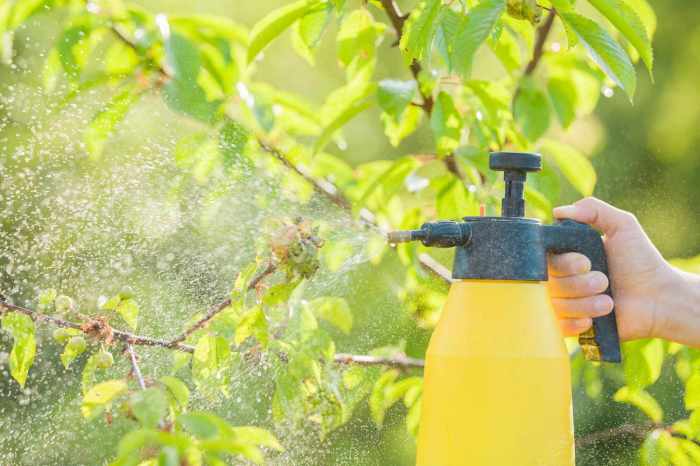Can You Spray Soapy Water on Plants?
Benefits of Soapy Water on Plants
Can you spray soapy water on plants – Soapy water, when used correctly, can be a surprisingly effective and environmentally friendly method for controlling certain plant pests. Its effectiveness stems from its ability to disrupt the pests’ life cycle, often by suffocating or dehydrating them. However, it’s crucial to understand both the benefits and potential drawbacks before applying it to your plants.
Pest Control with Soapy Water
Soapy water is most effective against soft-bodied insects like aphids, mealybugs, spider mites, and whiteflies. These pests are vulnerable to the soap’s ability to break down their protective outer layers, leading to dehydration and death. It’s less effective against harder-shelled insects or those that burrow into plant tissues.
Plants Responding Well to Soapy Water

Source: regretless.com
Many plants tolerate soapy water applications well, including various vegetables (tomatoes, cucumbers, peppers), flowering plants (roses, petunias), and herbs (basil, mint). However, the suitability depends on the plant’s sensitivity and the soap’s concentration. Always test on a small area first.
Creating a Safe Soapy Water Solution
A safe and effective solution typically uses a mild dish soap diluted in water. Avoid using harsh detergents or soaps containing additives like bleach or fragrances. A general guideline is to mix 1-2 teaspoons of mild dish soap per gallon of water. Always test the solution on a small, inconspicuous area of the plant before applying it liberally.
Risks and Side Effects of Soapy Water on Plants
While generally safe, soapy water can harm plants if used improperly. Overuse or using a solution that’s too concentrated can damage plant leaves, causing browning, wilting, or even death. The type of soap also matters; harsh soaps can be far more damaging than mild dish soaps.
Negative Effects of Excessive Soap Use
Applying too much soapy water can clog the plant’s stomata, tiny pores on leaves that facilitate gas exchange and water uptake. This can lead to reduced photosynthesis and overall plant stress. Symptoms include leaf yellowing, stunted growth, and reduced yield.
Soap Type and Plant Health
Mild dish soaps are generally preferred for their low toxicity and effectiveness. Avoid using soaps containing harsh chemicals, perfumes, or disinfectants. Commercial insecticidal soaps are formulated for pest control but may still cause damage if overused or applied incorrectly. They often contain higher concentrations of soap and may have additional ingredients.
Homemade vs. Commercial Insecticidal Soaps, Can you spray soapy water on plants

Source: broadpick.com
Homemade solutions offer greater control over ingredients and cost less, but they may not be as potent as commercial insecticidal soaps. Commercial products are often more concentrated and may contain additional ingredients designed to enhance their effectiveness against specific pests. The choice depends on the severity of the infestation and the plant’s sensitivity.
Application Methods and Techniques
Applying soapy water correctly is essential for effectiveness and to minimize harm to the plant. Methods include spraying, dipping, and wiping, each suitable for different situations and plant types.
Step-by-Step Application Guide
1. Prepare the soapy water solution according to the recommended concentration. 2. Apply the solution to the affected plant parts, ensuring thorough coverage. 3.
Avoid spraying during peak sunlight hours to prevent leaf burn. 4. Reapply as needed, following the recommended frequency. 5. Monitor the plant for any adverse reactions.
Application Frequency and Concentration
| Plant Type | Soap Concentration (tsp/gallon) | Application Frequency | Application Method |
|---|---|---|---|
| Aphids on Roses | 1-2 | Every 3-5 days | Spraying |
| Mealybugs on Succulents | 1 | Weekly | Wiping |
| Spider Mites on Tomatoes | 2 | Every 2-3 days | Spraying |
| Whiteflies on Basil | 1 | Every 3 days | Spraying |
Spraying Technique Illustration
Imagine a hand-held sprayer with a nozzle that produces a fine mist. The illustration would show the sprayer held approximately 6-12 inches from the plant, angled slightly downwards to avoid runoff. The spray should thoroughly coat the leaves and stems, but not to the point of dripping. The image would highlight the importance of covering both the upper and lower surfaces of the leaves, where pests often congregate.
Avoid spraying directly onto flowers, as the soap can damage delicate petals.
Specific Plant Types and Soapy Water
The suitability of soapy water varies among plants. Some plants are more tolerant than others. Always perform a test application on a small area before treating the entire plant.
Plant Sensitivity to Soapy Water
- Vegetables: Generally tolerant, but avoid over-application. Tomatoes and cucumbers are usually more sensitive than peppers.
- Flowers: Some flowers, especially those with delicate petals, are sensitive to soapy water. Test on a small area first.
- Herbs: Basil, mint, and rosemary are usually tolerant, but over-application can cause leaf damage.
- Sensitive Plants: Ferns, African violets, and certain succulents may be more prone to damage.
Alternatives to Soapy Water for Pest Control

Source: treehugger.com
Generally, spraying soapy water on plants isn’t recommended, as it can damage leaves and disrupt their natural processes. However, the question of what’s best for plant health often depends on the specific plant; for instance, you might consider alternatives if you’re interested in learning more about which plants thrive in a purely aquatic environment, as detailed in this helpful guide on what plants can grow in just water.
Ultimately, understanding a plant’s needs before applying any treatment, including soapy water, is crucial for its well-being.
Several alternative, natural pest control methods exist, each with varying effectiveness and suitability depending on the specific pest and plant.
Comparing Pest Control Methods
| Method | Effectiveness | Advantages | Disadvantages |
|---|---|---|---|
| Soapy Water | Good for soft-bodied insects | Easy to make, inexpensive, environmentally friendly | Less effective against some pests, can damage plants if overused |
| Neem Oil | Effective against a wider range of pests | Organic, relatively safe for plants and beneficial insects | Can be more expensive, requires careful application |
| Insecticidal Soap | Potent against many soft-bodied insects | Readily available, often more effective than homemade solutions | Can be harmful to beneficial insects, may damage plants if overused |
Scenario Comparisons
Soapy water would be ideal for a light aphid infestation on a hardy vegetable plant like peppers. Neem oil would be preferable for a more severe infestation of multiple pest types, or for plants sensitive to soapy water.
Expert Answers: Can You Spray Soapy Water On Plants
What kind of soap is best for plants?
Mild dish soap, like Dawn, is often recommended, but always dilute it heavily. Avoid soaps with added fragrances or chemicals.
How often can I spray soapy water on my plants?
It depends on the infestation and plant type. Start with a single application and monitor for improvement. Repeat only if necessary, and avoid over-application.
Will soapy water harm beneficial insects?
Yes, it can. While effective against many pests, soapy water can also harm beneficial insects like ladybugs and bees. Targeted application is key.
What should I do if I accidentally use too much soap?
Immediately rinse the affected plants thoroughly with plain water to dilute the soap concentration.




















